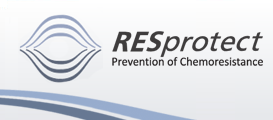| RESprotect grants North America-License to AustCancer |

|

|

|
RESprotect grants North America-License for anti-cancer drug to AustCancer20th September 2004 - RESprotect GmbH from Dresden signed an license agreement with Australian Cancer Technology ("AustCancer") (ASX:ACU). The Australian Biotech company specialized to oncology, acquires the license for the use of the anti-cancer drug RP101 in North America. The drug is the first commercial breakthrough of the company. Anti-cancer drugs that are developed. RESprotect develops at present four additional anti-cancer drugs. RP101 is targeted at preventing cells from developing a resistance to chemotherapy. In most cases, long term treatment with chemotherapy leads to resistance against this treatment. This is one of the most challenging areas facing oncologists. RP101 would used as a co-treatment with cytostatic drugs to give a broader range of chemotherapy treatment options, thereby extending survival periods and improving quality of life for the cancer patients. RP101 has demonstrated promising results in a clinical Phase I/II pilot study. AustCancer has developed an accelerated clinical trial program for RP101 which would include application to the US FDA for Orphan Drug status. A Phase I/II pilot clinical study with 30 patients in Saxonian clinics over 5 tumor types (metastasized breast, metastasized ovarian, non small cell lung cancer, small cell lung cancer and metastasized pancreatic cancer) was completed in 2003 with different chemotherapy agents. Unexpected results led to an enlargement of the pilot trial in respect to metastasized pancreatic cancer patients. An interim analysis, it seems likely that RP101 co-treatment significantly enhances survival time, remissions, time to progression and response to chemotherapy. RESprotect's founder and major sharehoulder, geneticist Professor Dr. Rudolf Fahrig commented that
AustCancer's Chairman, Dr. Roger Aston said, "While the patient numbers in the previous pancreatic trials were small, the results appear significant. We believe that the drug may offer new or significant improvements for pancreatic cancer by satisfying unmet medical needs, and therefore might qualify for Orphan Drug status when lodge the IND (Investigative New Drug application) in the US next year". Cancer of the pancreas is the fifth leading cause of cancer deaths with mean survival time for locally metastasized pancreatic cancer of 4-6 months with a 2-year survival rate of 10%. There are approximately 20,000 new pancreatic cancer patients in the US or Europe each year. RESprotect is closely associated with the Universities of Leipzig, Munich, Vienna and The Technical University of Dresden. The intellectual property for this development came from the Fraunhofer Society of Munich, a leader in applied research in Europe, where Prof. Fahrig worked unil the year 2000. Professor Fahrig has agreed to join the AustCancer Scientific Advisory Board.
Please direct enquiries to: RESprotect GmbH Prof. Dr. Rudolf Fahrig Fiedlerstr. 34 D-01307 Dresden Germany Phone: +49 351 4503201 This e-mail address is being protected from spam bots, you need JavaScript enabled to view it www.resprotect.de Australien Cancer Technology Limited Paul Hopper Managing Director, Level 36, Suite 4, 88 Philip Street SYDNEY New South Wales, Australia 2000 Phone: +61 2 9252 6899 Cell: +61 407 118 366 This e-mail address is being protected from spam bots, you need JavaScript enabled to view it www.austcancer.con.au
About RESprotect Chemogenomics, the approach of RESprotect, focuses on the applicationof small synthetic molecules, which elicit favorable phenotypicchanges. The combination with genomic tools concentrating on specificbiological pathways allows a better understanding of the broader effectof the drug. By doing so, it is possible to discover drugs that targetthe cause of a disease rather than ist symptoms. RESprotect's compoundsare given additionally to standard chemotherapy. Chemotherapy reliesupon the induction of apoptosis (self inflicted death) of tumor cells,which is the main anti-cancer mechanism. One major problem inchemotherapeutic treatment is the induction of chemoresistance, whichantagonizes the apoptosis of cancer cells. The chemogenomics approachof RESprotect resulted in the identification of a number of validatedtargets contributing to the development of chemoresistance byantagonizing apoptosis. RP101, the Company's first small molecule drugcandidate, suppresses the over-expression of apoptosis-antagonizinggene products induced by cytostatic drug treatment. About Australian Cancer Technology
|


